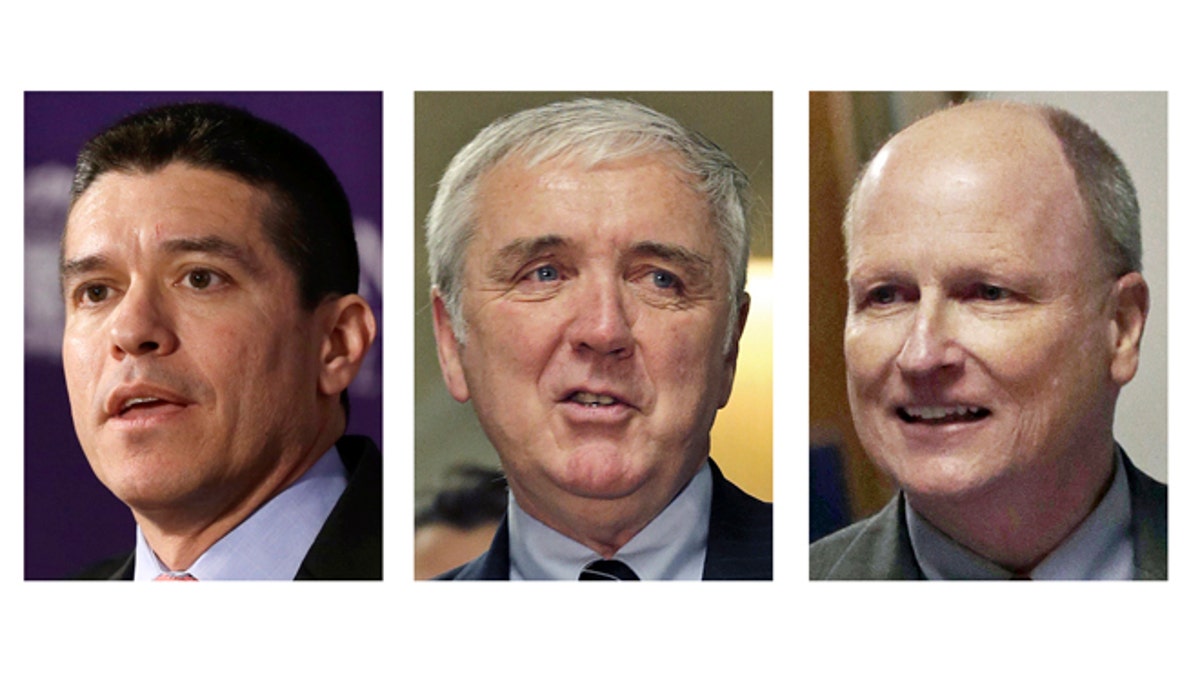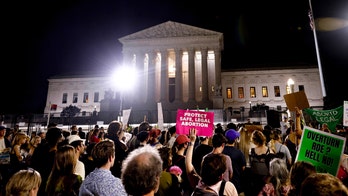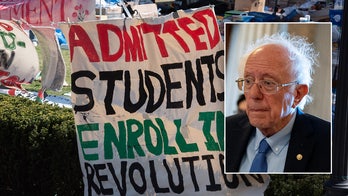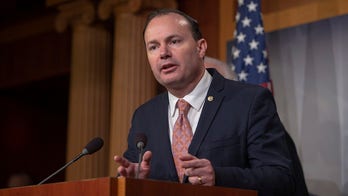
This panel of March 2013 file photos show Republican candidates for U.S. Senate, from left, Gabriel Gomez, Michael Sullivan, and Daniel WInslow, vying for their party's nomination in the special April 30, 2013 primary. (AP)
BOSTON – Even before the explosions, polling suggested that Massachusetts voters weren't excited about the looming special election to replace former U.S. Sen. John Kerry.
But in the days after bombs ripped through the Boston Marathon's crowded streets, politics were all but forgotten as authorities launched an unprecedented manhunt and a region grappled with terror. It didn't matter that competitive primary contests were 15 days away; everything was put on hold.
"There are things that are more important than campaigning and that horrific event was clearly one of them," said U.S. Rep. Ed Markey, who is competing against U.S. Rep. Stephen Lynch for the Democratic nomination to replace Kerry, now the secretary of state.
After suspending political activities for roughly a week, the candidates have been forced to walk a delicate balance as they engage voters ahead of Tuesday's Republican and Democratic primaries. They have largely avoided the site of the attack out of sensitivity for victims, but some have tweaked campaign advertising to address the bombing, highlighted their national security credentials and tried to use the sudden focus on terrorism to shift the direction of the race.
"It completely changed the landscape," Lynch aide Scott Ferson said of the bombing.
Indeed, a campaign once dominated by debates about the environment, health care and women's rights has become more focused on enemy combatants, Miranda rights and counterterrorism agencies. Some candidates welcomed the shift.
On the Democratic side, Lynch has seized on national security in recent days to attack Markey, thought to be the front-runner. One of the most memorable moments in last week's Democratic debate, just a week after the bombing, focused on support for federal security efforts
"Unlike my colleague Mr. Markey, I've actually voted for the Department of Homeland Security appropriations bills," Lynch charged.
Markey responded: "He's taking a page right out of the Karl Rove swift boat playbook, and it's very sad, especially just one week after what just happened in Boston, Cambridge and Watertown."
Through Tuesday's primary election, Markey outspent Lynch on television advertising $1.7 million to $1.2 million, according to advertising figures obtained by The Associated Press. But only Lynch focused on the bombings in a television ad that blanketed the state last week, while Markey focused on traditional Democratic priorities such as women's reproductive rights.
"We hold in our hearts those we lost, but we will get through this together and work toward a brighter day," Lynch says in the campaign ad.
But Lynch was forced to distance himself last week from a so-called robo-call made on his behalf by the leader of an ironworkers' union, who mentions the bombings while encouraging voters to support someone who "understands the day-to-day problems facing working families." It was an awkward moment for the Lynch campaign, which called on the group to stop the calls.
But it's unclear how many people were paying attention.
"Whatever momentum this primary had -- and it didn't have a lot -- was totally exhausted by the bombing," Massachusetts Secretary of State William Galvin said.
Weeks before the blasts, Steve Koczela, president of MassINC Polling Group, found that more than 40 percent of likely Democratic voters and nearly 50 percent of likely Republican voters hadn't settled on a candidate.
"It just doesn't seem like -- even as of the last poll -- people were really paying attention to who was running," Koczela said. "There's room for any of the candidates to make a move."
On the Republican side in particular, the recent violence shifted the contours of the contest.
GOP candidate Gabriel Gomez, a former Navy SEAL, finished running the marathon minutes before the bombs exploded along the finish line, killing three and injuring more than 260.
Like other candidates, Gomez immediately pulled television ads off the air and suspended campaign activities. He said he was focused on being respectful as he eased back into campaigning the following weekend.
"We can't let the terrorists win and completely suspend what is fundamental right in the United States," Gomez said.
He charged that President Barack Obama's administration should have designated 19-year-old suspect Dzhohkar Tsarnaev an "enemy combatant" and tried him outside the traditional criminal justice system.
Another GOP candidate, Mike Sullivan, says the federal government should have denied Tsarnaev his Miranda rights, tried him as an enemy combatant and revoked his U.S. citizenship.
"Our first concern must always be preventing future terrorist acts against our people," said Sullivan, a former U.S. attorney whose campaign has been reminding people that he previously led the prosecution of shoe bomber Richard Reid.
Republican candidate Dan Winslow, a former judge and chief legal counsel under former Gov. Mitt Romney, said the entire GOP field has experience with national security.
"We've got a Navy SEAL, a former prosecutor and a former judge all in the field for Republicans," Winslow said. "I think we all have our own credentials. The key is, Who's got the better ideas? Who's got the better electability in June?"
The key may also be which candidate can get his supporters to get to the polls as the bombing continues to dominate attention in Massachusetts. State officials were already predicting a low turnout, likely less than 20 percent of eligible voters, even before the attack.
Wendy Becker, 45, of Newton, was among the thousands who visited the bomb site in Copley Square late last week. A registered voter, she said she didn't know the primaries were happening so soon.
"I didn't even know it was Tuesday and haven't cared," she said, noting that her little brother and brother-in-law ran in the marathon. She's been glued to the television coverage of the aftermath ever since.
The general election, featuring the primary winners, is scheduled for June 25.




